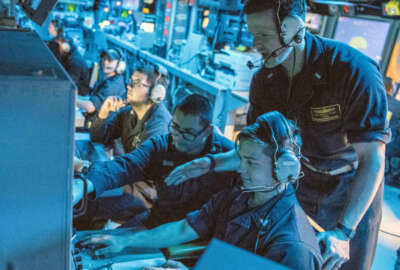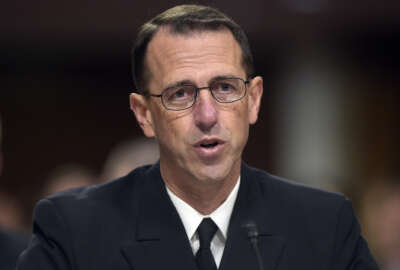
Exclusive
Navy CNO says new leadership framework is a ‘wake up call’
The Navy is trying to instill character and creativity in its sailors with a new leadership program.
The Navy’s top officer says the service’s new emphasis on character in its leaders is meant as “a wake up call” for the service to be more competitive.
Senior military leaders from all branches said in the past that the military is losing its advantage over near peer adversaries like China and Russia. The Navy is taking that to mean it needs better leadership within its ranks.
“Particularly in the maritime we’ve enjoyed preeminence. Those times are coming to a close and we are being contested now in some very important parts of the world and so there is this return to competition. There is a need for leadership,” said Chief of Naval Operations Adm. John Richardson in an interview with Federal News Radio.
Last week, the Navy revamped its training paths for officers and enlisted leaders to better emphasize personal attributes that could be beneficial to the service.
The new framework for talented sailors focuses on developing character along with competency in skills as previous programs did.
“Competence and character are so tightly intertwined that they must be strengthened together. The Navy has a robust program of schools, on-the-job training , and self-guided learning. By executing this framework, our Navy will produce leaders and teams who learn and adapt to achieve maximum possible performance,” stated the Navy’s Leadership Development Framework, released on Jan. 25.
Richardson said character involves finding the people who are attracted to the sacrifice of military service.
“It is this value proposition that we bring that we have a commitment to honor and courage and to the constitution, something bigger than ourselves,” Richardson said.
The push for those attributes comes after the Navy dealt with a series of scandals from some high level leadership, most notably the Fat Leonard scandal in which a contractor bribed Navy officers.
But the plan is more than just making sure Navy leaders are good people, it creates room for leaders to break out of the cookie cutter pathways to leadership and allows for some personal broadening.
It gives officers and enlisted sailors a way to break out of what former Defense Secretary Ash Carter called the “five-sided box.”
As the military expands into less conventional domains like cyber and space, it needs leaders who are flexible, smart and talented.
“There is a tremendous role for creativity in competition. Everyone has their own set of heroes, leaders they would say epitomize leadership. … My experience with those leaders is they are constantly looking for ways to out-fox their competition, they are studying hard, they are experimenting, they are going everywhere it takes to find some way to win. It is this almost obsession with finding a way to come out ahead that we are trying to instill,” Richardson said.
Richardson said the challenge is doing that while making it sustainable to the Navy.
“You can’t drive your team into the stops and expect to consistently win,” Richardson said. “It’s about balance.”
The Navy framework uses three methods to move down the path of leadership development. Leaders will use schooling, job training and self-guided learning to ascend to higher levels in the service.
To foster the “character” side of sailors, the Navy will lay a foundation by making institutional values and expectations clear.
Latest Navy News
Enlisted ranks will take local classes made up of lectures, group discussions and coaching. The pinnacle of enlisted leadership is the senior enlisted academy.
Officers will go through formal leadership schooling associated with major career milestones at the Naval Leadership and Ethics Center. The courses will include department head, commanding officer and major command classes.
Outside of the classroom, leaders will be expected to show character on the job too.
“Character applies in an operational setting — it’s not just for the classroom. The best leaders mention it at briefs, during execution, and during debriefs. They get out in front and avoid bad decisions. The strongest message comes through their personal example,” the framework stated.
Leaders will personally enrich themselves through a suggested reading list by the chief naval officer, writing blogs, taking college courses at night or online and joining professional societies.
Copyright © 2025 Federal News Network. All rights reserved. This website is not intended for users located within the European Economic Area.
Scott Maucione is a defense reporter for Federal News Network and reports on human capital, workforce and the Defense Department at-large.
Follow @smaucioneWFED




